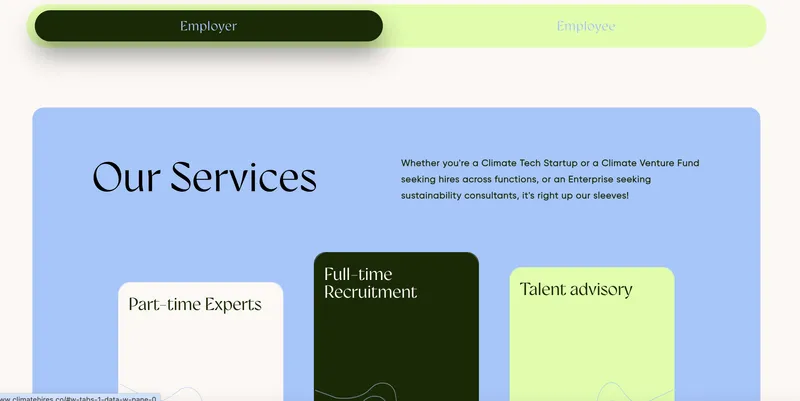Greener workforce: How Climate Hires is bringing climate roles to professionals
Climate Hires, a climate-focused recruitment firm started by Aastha Bharadwaj in 2023, helps job seekers wanting to transition into the space and companies recruit talent in climate roles.
While on sabbatical, Ameya Ayachit was asked by his former colleague, Aastha Bharadwaj, to meet with the CEO of Smart Joules—a company focused on decarbonisation. The conversation sparked a new chapter for Ayachit, who soon joined Smart Joules as its Chief People Officer.
“During my sabbatical, I took a hard look at my life and realised that despite working across various sectors, I hadn’t truly made an impact. In each role, I was focused on providing convenience to the customer, but I kept wondering—am I contributing to something that makes an impact in the world?” Ayachit shares with SocialStory.
Ayachit consciously chose to step into the climate sector as he believed it required skilled people with passion. Like him, many others are now finding climate-specific job opportunities through Climate Hires, started by Bharadwaj in 2023.
“I've seen people so interested in doing something more impactful with their careers nowadays that I wanted to help people who are looking to transition. I wanted to be a platform for both parties—for companies wanting to build talent in the climate and for people wanting to transition,” she says.
The journey to climate impact

Aastha Bharadwaj
After completing her graduation in Economics and English from Delhi University and an MBA in HR from Amity University, Bharadwaj joined a Bengaluru startup and worked closely with the founders to help them scale.
She says, “I enjoyed being part of the journey, understanding how founders approach talent acquisition, interact with candidates, and persuade them to join. Back in 2015, startups were still relatively new, so it was a unique experience.”
Soon after, she joined logistics company Blue Yonder (formerly JDA Software), where she led various functions, including hiring, and also worked at Go-Jek, where she spent three years leading hiring for engineering roles.
Bharadwaj recalls that she often engaged in side projects like organising water-saving initiatives in her apartment complex, educating residents on reducing RO water waste, and repurposing it for tasks like mopping. Over time, her interest in environmental causes grew stronger, and she decided to work in the impact space.
“I've always wanted to work on something more impactful, something that gives my job a deeper sense of meaning,” she says, adding, “I've worked with various startups in recruitment and wanted to leverage those skills to work in the climate space for a very long time. So, I thought of combining the two, and that's how Climate Hires began as a passion project.”
While working with climate tech startups, Bharadwaj saw a clear need for this platform and the first-mover advantage since no one else was doing it. But it was not without its trials and tribulations.
According to her, attracting experienced professionals to work for a startup is challenging because these experts—often professors, PhD graduates, or lab researchers—aren't typically active on networking platforms, including LinkedIn.
Additionally, bringing people from big companies to work for new startups is a challenge. In fact, she reveals that people are not aware that they do not need extra certifications or advanced degrees to work in different roles in this field.
“Skills in finance, marketing, or communications are in high demand among climate-focused startups, but many people aren't aware of the opportunities—and they don't always have to take a pay cut,” Bharadwaj says, adding that she raises awareness through conversations and LinkedIn posts to break such myths.
Meanwhile, her transition to entrepreneurship had its own set of struggles.
“You're handling everything from business development to deliverables and scaling the business, and it’s challenging. People see you as someone who can help them get a climate job or find climate talent, so there’s a lot of pressure,” she adds.
Despite the challenges, she believes the journey so far has been a great learning experience.
“I’m also trying to learn different aspects of climate since I’m not an expert in every role. There's a lot of homework and background work for each person and role we handle—it’s constant learning to stay updated on everything happening in the climate worldwide,” she adds.
Recruiting for climate
Bharadwaj explains that Climate Hires caters to people looking for jobs and companies offering such roles.
The person looking for a job can visit the website and explore various climate sectors, such as carbon, energy, and e-mobility. The careers page lists open full-time and part-time roles from the startups’ clients as of now, but Bharadwaj aims to expand it to include more job opportunities.
Users can also register on the platform’s database, which the startup will use to refer to for new roles. Additionally, there’s an option to schedule a call with Bharadwaj to discuss career transitions and job opportunities.
On the employer's end, Bharadwaj Initially has a call with the founders or hiring managers to understand their company and its needs. Climate Hires also conducts market mapping to identify talent, followed by handling interviews. Market mapping helps the startup locate the right candidates, particularly in the niche climate sector, where talent pools can be small.
During the interview process, Climate Hires conducts the initial rounds, involving non-technical assessments, such as behavioural checks and basic skills relevant to the role.
“We do a lot of filtration at our end, and that's why we're able to build that trust with our clients,” she adds.

The platform offers jobs in sectors, such as carbon, energy, and e-mobility.
The roles are mixed with climate-specific skills and generic functions like engineering, sales, marketing, or finance. So far, the bootstrapped startup has over 250 registered users on its platform and is working with 15 companies.
Sentra.world, a B2B SaaS carbon accounting software company, is one of Climate Hires’ clients. Co-founder and CEO Harsh Choudhary says that, unlike other recruiting platforms, Climate Hires handles the end-to-end recruiting process.
“They don’t just send profiles but also do the screening, so no unsuitable or random profiles come in,” he says.
He notes that the climate space is for passionate people. Although many are joining the sector, there is still a long way to go. “We need to realise that working in the climate space has to be a serious career choice,” he adds.
Bharadwaj believes that having the first-mover advantage has allowed her to tap into the market. She plans to develop a resource section on the platform that includes monthly emails and blogs and organise events like virtual and offline career fairs—virtual and offline.
Additionally, she plans to expand her team to manage the client base in the next six months.
Edited by Suman Singh







